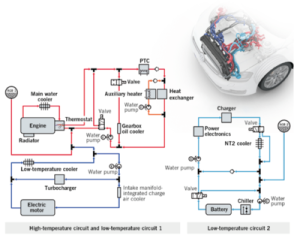
IPFS News Link • Transportation
The High Cost of Electronic Cars
• Eric Peters AutosHere's why:
While it is true that an electric motor, as such, is a very simple thing (and one of the things often touted as an advantage electric cars have vs. a car with an engine, which has many moving parts) the electronics that control the motor (in an EV) are not simple. It is a foundational mistake to equate the electric motor in an electric car with the electric motor that spins a small appliance, such as a power drill. The latter has simple electronics; a speed controller – and that's about all, besides the motor. An EV's motor requires a computer controller which governs a myriad of operating parameters as well as the overall operation of the car, itself – and all of its myriad electronically controlled related and secondary systems, such as the drive-by-wire system, battery cooling (and heating) system as well as its charging system.
Modern combustion-engined cars have similar electronic systems, of course, that govern their myriad systems. But that is precisely why modern combustion-engined cars have become less reliable over time than the less-electronicized cars of the past and more disposable, as they age, because of the cost of replacing critical electronic controls without which the vehicle or vital systems will not operate relative to the depreciating value of the vehicle, itself.
EVs double down on that problem – by electronicizing everything. Even the heater (for the people).
And then there is the EV's electric battery, itself – a hugely complex thing made of hundreds/thousands of individual cells, all of them a potential failure point (and fire source) and the whole thing certain to degrade in function over time the more it is used and thus the faster it will wear out, in term of its capacity to receive and retain full charge.
An analogy that works is a battery-powered electronic device such as an iPod. Anyone who has owned one of these things is aware that, after about 2-3 years of regular use, the iPod's battery doesn't hold as much charge as it did when it was new. And the iPod's battery doesn't have to move the iPod. This latter is not analogous – as regards the battery pack in an EV – which is massive precisely because it does have to move the thing, which places a massive load on the thing.
































